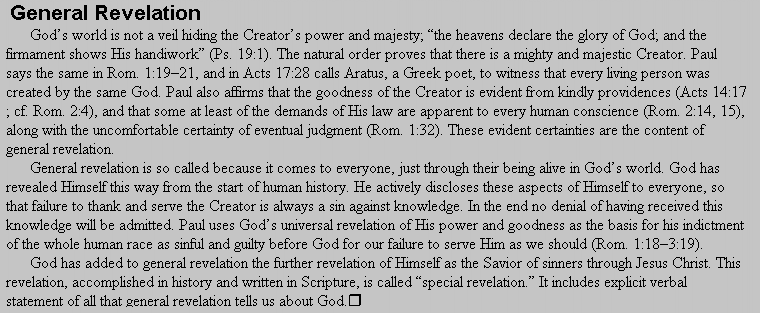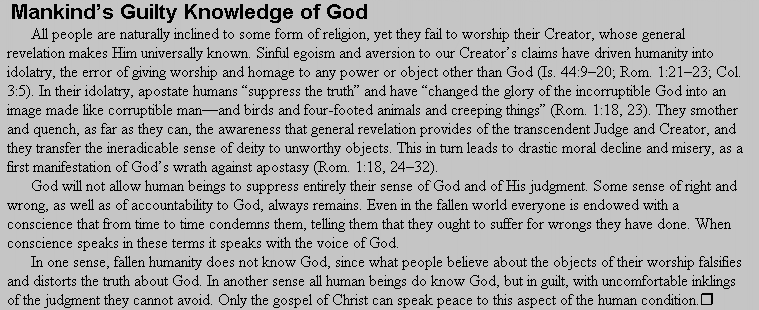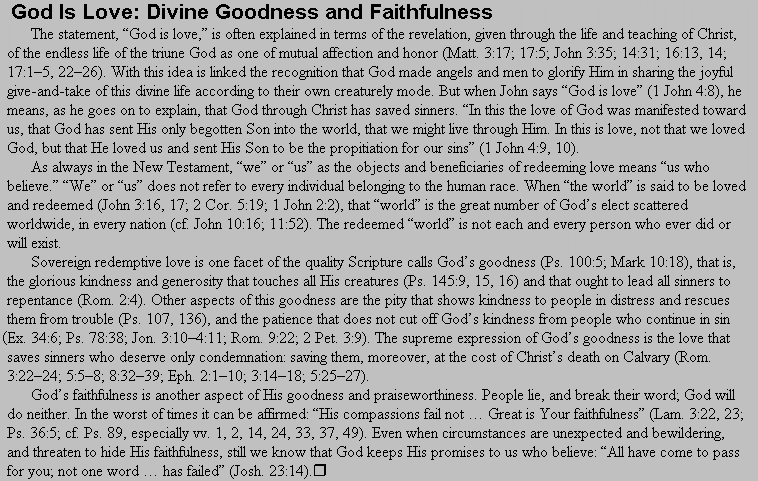
Romans 1:16 I am not ashamed of the gospel. Although the gospel is folly to the cultured, Paul sees his message as divine wisdom (I Corinthians 1:22–25, 30), and is not embarrassed by God’s way of salvation. See "Salvation" at Acts 4:12.
power. The regenerating, life-changing impact of the gospel word through the Holy Spirit is essential because of humanity’s bondage to sin and Satan, and weakness and spiritual inability on account of sin (5:6; 8:5–9).
believes. Salvation is unmerited, but it is not universally enjoyed; faith is required for it.
for the Jew first. While this was true in terms of the history of redemption (2:9, 10; John 4:22; cf. Mark 7:24–30), it was also the pattern of Paul’s missionary outreach. Hence, in visiting the cities of the Roman world he began by expounding Scripture in the synagogues where possible, and he preached Christ as the fulfillment of the Old Testament promises (Acts 9:20; 13:5, 14; 14:1; 17:1, 17; 18:4, 19, 26; 19:8). Throughout Romans, Paul is careful not to deny the validity of the God-given privileges of His own people (3:11, 12; 9:4, 5).
Romans 1:17 righteousness of God. This is a key phrase in Romans (3:21; 5:19; 10:3), regularly explained in the letter as "righteousness … through (or of) faith" (3:22; 9:30; 10:6). God’s righteousness is shown in the righteousness of Christ that is imputed to, or considered by God to belong to, the one who believes. This imputation of righteousness to sinners who believe is fully consistent with the personal righteousness of God. As a just and righteous judge (2:5–16), God through the death of His Son justifies, or declares righteous, those sinners who come to true faith in Christ (3:21–26; 5:10). Luther’s reading of this verse had a decisive impact on his understanding of justification.
from faith to faith. Paul emphasizes that at every point of its influence the gospel depends on faith, not works.
as it is written. Habakkuk 2:4 provides the biblical basis for and summary of what follows, indicating that the way of life by faith was already known in the Old Testament.
shall live. Life in contrast with spiritual death, and life in the sense of continuing in fellowship with God. From first to last, godly living means trusting in God and depending on His grace.
Romans 1:18 wrath. The divine Judge’s righteous retribution and personal revulsion evoked by moral evil.
is revealed. God’s judgment is not limited to the future; His antagonism to sin is already shown in the world. Its effects are visible even now.
ungodliness and unrighteousness. The order may be significant—since moral decay follows theological rebellion. Or Paul may be using the two words together to express one idea, wicked ungodliness.
suppress the truth. It is not that the truth is sought but cannot be found, but rather that, confronted with the truth (which is "clearly seen," v. 20), fallen humanity seeks to hinder and obstruct its influence, and is therefore "without excuse" (v. 20). The "excuse" in view is an appeal to ignorance.
Romans 1:19 what may be known of God. Paul stresses the reality and universality of divine revelation, which is perpetual ("since the creation," v. 20) and perspicuous ("clearly seen," v. 20). Divine invisibility, eternity, and power are all expressed in and through the created order

The invisible God is revealed through the visible medium of creation. This revelation is manifest; it is not obscured but clearly seen.
Psalm 19
To the chief Musician, A Psalm of David.
1
The heavens declare the glory of God; and the firmament sheweth his handywork. 2Day unto day uttereth speech, and night unto night sheweth knowledge. 3There is no speech nor language, where their voice is not heard. 4Their line is gone out through all the earth, and their words to the end of the world. In them hath he set a tabernacle for the sun, 5Which is as a bridegroom coming out of his chamber, and rejoiceth as a strong man to run a race. 6His going forth is from the end of the heaven, and his circuit unto the ends of it: and there is nothing hid from the heat thereof.7
The law of the LORD is perfect, converting the soul: the testimony of the LORD is sure, making wise the simple. 8The statutes of the LORD are right, rejoicing the heart: the commandment of the LORD is pure, enlightening the eyes. 9The fear of the LORD is clean, enduring for ever: the judgments of the LORD are true and righteous altogether. 10More to be desired are they than gold, yea, than much fine gold: sweeter also than honey and the honeycomb. 11Moreover by them is thy servant warned: and in keeping of them there is great reward. 12Who can understand his errors? cleanse thou me from secret faults. 13Keep back thy servant also from presumptuous sins; let them not have dominion over me: then shall I be upright, and I shall be innocent from the great transgression. 14Let the words of my mouth, and the meditation of my heart, be acceptable in thy sight, O LORD, my strength, and my redeemer.

Romans 1:21 knew God. Here Paul stresses that humanity not only has the opportunity to know God through general revelation, but that the revelation yields real knowledge. Humanity’s sin is the individual refusal to acknowledge what is already known to be true. While knowing God, people refuse to honor Him as God or give thanks to Him. The consequence of rejecting God was that their minds and hearts grew dark. A refusal to honor God leads all intellectual pursuits to frustration.
Romans 1:22, 23 Professing to be wise, they became fools … changed the glory of the incorruptible God. Intellectual arrogance before God displays a reversed sense of values; the worship of God is exchanged for devotion to man-made and man-reflecting idols. The indelible instinct to worship is perverted by being centered on the wrong object (v. 25).
Romans 1:24 God also gave them up. Judgment involves the removal of divine restraints, both on sinful actions and on their consequences (vv. 26, 28).
Romans 1:26, 27 The effect of perverting the instinct to worship God is the perversion of other instincts from their proper functions. Scripture views all homosexual actions in this light (Lev. 18:22; 21:13). The consequence is degradation of the body (v. 24), domination by lust, the disintegration of what is truly "natural" (v. 26), and bondage to uncontrollable passions (v. 27).
Romans 1:27 receiving in themselves the penalty. Even in a morally fallen and therefore (to humanity) unpredictable world, the harvest reaped is related to the crop sown (Galatians 6:7, 8).
Romans 1:28 did not like … God gave them over. Sin brings a disdain for true values, and risks abandonment by God to a spirit of licentiousness (vv. 29–31).
Romans 1:32 knowing the righteous judgment of God. Paul sees as evidence of the guilt and bondage of sin that the knowledge of divine judgment no longer acts as a restraint, but becomes a spur to further rebellion in the form of encouraging others to sin. This text confirms that part of God’s revelation in nature communicates His moral character and a sense of moral duty in humanity.
Romans 2:1–16 In what follows, Paul turns to an imaginary representative of a real and identifiable group of people. Although he specifically mentions Jews only at v. 17, he probably has them in mind already. They agree with his statement about God’s wrath, but assume they stand outside of it (hence his stern warning in v. 5). But the nature of this presumption, if not its specific form, is not limited to Jews. In this context Paul sets forth the principles of the divine judgment all must face. It is based on truth (v. 2) and marked by righteousness (v. 5). It is according to works (v. 6), impartial in nature (v. 11), and executed through Christ (v. 16). Such judgment will bring agonizing ruin to all sinners (vv. 8, 9).
Romans 2:1 inexcusable. Paul unmasks those who will agree with his exposition of divine wrath on sin (1:18–32) but assume they are immune to it. practice the same things. Their judgment of others is also in effect a self-condemnation (v. 3).
Romans 2:2 according to truth. A link with 1:18. God’s judgment is based on the reality of the individual’s response or non-response to Him, not on other considerations.
Romans 2:4 despise. They refuse to acknowledge that the kindness of God is intended to produce sorrow for sin and a turning away from it. They despise this purpose of divine generosity, and thereby show disdain for God Himself.
Psalm 136
1
O give thanks unto the LORD; for he is good: for his mercy endureth for ever. 2O give thanks unto the God of gods: for his mercy endureth for ever. 3O give thanks to the Lord of lords: for his mercy endureth for ever. 4To him who alone doeth great wonders: for his mercy endureth for ever. 5To him that by wisdom made the heavens: for his mercy endureth for ever. 6To him that stretched out the earth above the waters: for his mercy endureth for ever. 7To him that made great lights: for his mercy endureth for ever: 8The sun to rule by day: for his mercy endureth for ever: 9The moon and stars to rule by night: for his mercy endureth for ever.

Romans 2:5 treasuring up … wrath. Religious presumption is "hardness," since continued resistance to God’s purposes in showing grace is a refusal of God’s will, and increases guilt while protesting innocence. Wrath is stored up, pointing forward to proportionate punishment in hell.
Luder Whitlock, Jr., executive director; R. C. Sproul, general editor, New Geneva study Bible [computer file], electronic ed., Logos Library System, (Nashville: Thomas Nelson) 1997, © 1995 by Foundation for Reformation.
General Editor, R. C. Sproul, Drs. Ligonier Ministries
Old Testament Editor, Bruce Waltke, Th.D., Ph.D. Regent College
New Testament Editor, Moises Silva, Ph.D. Westminster Theological Seminary
Executive Director, Luder Whitlock, Jr., D.Min. Reformed Theological Seminary
Associate Editors, James Boice, D.Th., Tenth Presbyterian Church; Edmund Clowney, S.T.M., D.D. Westminster Theological Seminary; Roger Nicole, Ph.D. Reformed Theological Seminary; J. I. Packer, D.Phil. Regent College
Assistant Editors, William B. Evans, Ph.D. (cand.) Erskine College; John Mason, Ph.D. (cand.) Nashville Presbytery,Presbyterian Church in America
Old Testament Contributors; Carl E. Armerding, Ph.D. Schloss Mittersill Study Centre; Raymond Dillard, Ph.D. (deceased) Westminster Theological Seminary; William Dumbrell, Ph.D. Moore Theological College; Mark Futato, Ph.D. Westminster Theological Seminary in California; Graeme Goldsworthy, Ph.D. Moore Theological College; J. Alan Groves, Ph.D. Westminster Theological Seminary; R. Laird Harris, Ph.D. (emeritus) Covenant Theological Seminary; Kenneth J. Howell, Ph.D. Reformed Theological Seminary; M. M. Kline, Ph.D. (cand.) Gordon-Conwell Theological Seminary; Gary Knoppers, Ph.D. Penn State University; Donald Leggett, Ph.D. Ontario Theological Seminary; V. Philips Long, Ph.D. Covenant Theological Seminary; Tremper Longman III, Ph.D. Westminster Theological Seminary; J. Gordon McConville, Ph.D. Wycliffe Hall, Oxford; Allan A. MacRae, Ph.D. (emeritus) Biblical Theological Seminary; Jeffrey Niehaus, Ph.D. Gordon-Conwell Theological Seminary; Dirk H. Odendaal, Ph.D. (deceased) University of Stellenbosch; Raymond C. Ortlund, Jr., Ph.D. Trinity Evangelical Divinity School; Gary Pratico, Th.D. Gordon-Conwell Theological Seminary; Richard L. Pratt, Jr., Th.D. Reformed Theological Seminary; Elmer Smick, Ph.D. (deceased) Reformed Theological Seminary; Marion Ann Taylor, Ph.D. Wycliffe College; Willem A. Van Gemeren, Ph.D. Trinity Evangelical Divinity School; J. Robert Vannoy, Th.D. Biblical Theological Seminary; Bruce Waltke, Th.D., Ph.D. Regent College; Barry Webb, Ph.D. Moore Theological College; Gordon Wenham, Ph.D. Cheltenham and Gloucester College of Higher Education; John Woodhouse, Ph.D. Moore Theological College
New Testament Contributors Knox Chamblin, Th.D. Reformed Theological Seminary; Karl J. Cooper, Th.M. Providence, RI; Sinclair B. Ferguson, Ph.D. Westminster Theological Seminary; T. David Gordon, Ph.D. Gordon-Conwell Theological Seminary; Wayne Grudem, Ph.D. Trinity Evangelical Divinity School; Charles Hill, Ph.D. Reformed Theological Seminary; Kenneth J. Howell, Ph.D. Reformed Theological Seminary; Dennis Ireland, Ph.D. Reformed Theological Seminary; Dennis Johnson, Ph.D. Westminster Theological Seminary in California; Peter Jones, Ph.D. Westminster Theological Seminary in California; Reggie M. Kidd, Ph.D. Reformed Theological Seminary; Simon J. Kistemaker, Th.D. Reformed Theological Seminary; W. Harold Mare, Ph.D. Covenant Theological Seminary; Dan McCartney, Ph.D. Westminster Theological Seminary; Leon Morris, Ph.D. (emeritus) Ridley College; Vern S. Poythress, D.Th. Westminster Theological Seminary; Moisés Silva, Ph.D. Westminster Theological Seminary; R. C. Sproul, Drs. Ligonier Ministries; Frank Thielman, Ph.D. The Beeson Divinity School; Joseph Trafton, Ph.D. Western Kentucky University